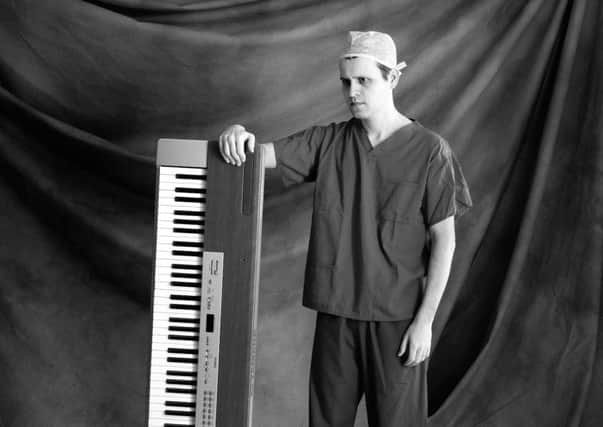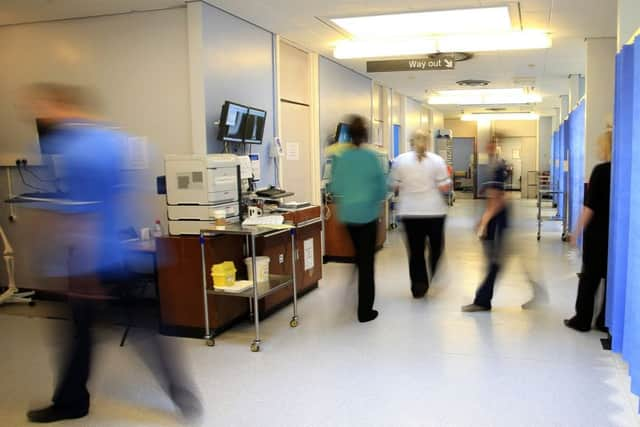From tragedy to comedy for former junior doctor turned best-selling author and performer


Adam Kay is now carving out a successful career in comedy - but his unexpected move into the entertainment industry came out of tragedy rather than humour. The former junior doctor made the difficult decision to walk away from the medical profession that he loved following a tragic incident on a labour ward.
While working as a senior registrar in obstetrics and gynaecology back in 2010, a complicated birth resulted in the death of the baby and the mother requiring an emergency hysterectomy in order to save her life. Kay was not in any way at fault but after six years of training and a further six working as a junior doctor, he decided he could no longer continue in medicine.
Advertisement
Hide AdAdvertisement
Hide AdSince then he has gone on to become an award-winning comedy performer and scriptwriter – he began writing and performing sketches at medical school – and last year his book This is Going to Hurt – Secret Diaries of a Junior Doctor was published.


It became, almost instantly, a bestseller, deservedly receiving plaudits for its forthright, candid, witty – and depressing – depiction of the reality of life for a medic working in the modern day NHS. His stand-up show of the same name is currently on tour and comes to York this week.
While the book is frequently laugh-out-loud funny, it is heartbreaking in equal measure. And for anyone who values the NHS it will raise the blood pressure. “I was blown away by the reaction to the book in all sorts of ways,” says Kay. “In terms of the critical acclaim and the number of copies sold but more importantly the response from the public and from the junior doctors I was hoping to represent.”
He was moved to publish his journals - “with the boring bits taken out” - after rediscovering them in his spare room in 2016 around the time that junior doctors were involved in a stand-off with the health secretary Jeremy Hunt. As Kay explains in his introduction ‘doctors were struggling to get their message across (probably because they were at work the whole time) and it struck me that the public weren’t hearing the truth about what it actually means to be a doctor.’ Today he says: “People need to know that junior doctors are not in it for the money.”
Advertisement
Hide AdAdvertisement
Hide AdKay wrote the diaries in secret after long shifts – a 97-hour week is not unusual – and he recognises now that it was a way of letting off steam and processing the immense stress he had to deal with on a daily basis.
“As a doctor you are obliged to write down a lot of stuff, so I started writing it without thinking about it too much,” he says. “But in retrospect I think it was my way of developing a coping mechanism. It was looking for a glimmer of light amongst the darkness.”
A disturbing thought occurred to me while reading the book, I tell him – many of the events that Kay describes happened over a decade ago and in the intervening years the situation for junior doctors, and NHS staff in general, must have deteriorated even further.
“Yes, it has absolutely got worse,” he says. “When I left, people didn’t really leave medicine – it was not something that was done. Now, not a week goes by when I don’t hear about a friend or colleague who has left because it has got so incredibly difficult. The stresses that were there when I was a junior doctor have multiplied – it is a hugely stressful job.”
Advertisement
Hide AdAdvertisement
Hide AdKay hopes the book may at least raise awareness of the scale of the NHS crisis and ensure that people get a balanced view of the high-pressure conditions under which those on the frontline are expected to work. He is unequivocal in his assessment of what needs to be done to save the NHS and fearful for its future if action isn’t taken pretty quickly.
“There is no mystery why there is a crisis in the NHS – it hasn’t had the money it needs for years, so it is not working as well as it should. Either it gets an enormous injection of funding or it fails and it is replaced by some awful hybrid. There is no way around it – if it doesn’t get that money, it won’t survive much beyond its 70th birthday.”
He urges people to get involved in campaigning to save the NHS and says he has been heartened by his experiences on last year’s author tour when it became obvious to him how much people, across the political spectrum, care about it.
“Get involved online, go out with banners and march, write to your MP. If that happens in enough parts of the country, the politicians will have to listen. Often it feels like you can’t do anything, but you can.”
Advertisement
Hide AdAdvertisement
Hide AdThe book is informative on so many different levels – it unflinchingly charts the terrible hours, belligerent patients, arrogant consultants, making life and death decisions on little or no sleep, missed social events and family gatherings, the strain on relationships – but one of the most shocking discoveries is learning how little pastoral support junior doctors receive.
“That was one of the key messages I wanted to get across – the idea of the doctor being human and fallible,” says Kay. “The old guard of consultants, who were around when I was still working the NHS, would say it’s all about keeping a stiff upper lip and having a drink, but I think there has been a slight cultural shift. Now there are a couple of Medical Schools teaching students about resilience and how to cope when things get really bad.”
Writing the book was, in some ways, a cathartic experience. For years he had not spoken about the reason behind his decision to leave the medical profession. “It’s not healthy not to talk about it,” he says. “But I think now attitudes are beginning to change and I’m hopeful that the book may help with that. I’m going around the country, not just doing the comedy show, but also visiting hospitals and medical schools talking to people and letting them know that it’s ok to admit it’s hard, it’s fine to be human.”
These are some of the subjects he will be exploring in his stage show. “It is billed as a comedy and for about an hour it is me being funny with the odd bits about the impact on my life. Then at the end I talk about my last day at work…” he trails off. “It is about inviting people to come and see a comedian and leaving them with a bigger and more important message.”
Advertisement
Hide AdAdvertisement
Hide AdWhile Kay suspects he will never go back into clinical practice he wants to make some kind of contribution. Leaving medicine was “heartbreaking”, he says, and has clearly left a huge gap in his life.
“I miss it hugely. It’s such an honour and a privilege to play that part in people’s lives. Sure there are the downsides, but the reason I went in to the profession in the first place have never gone away. Hopefully I will be back in some capacity – it is not going to be on a labour ward, but I hope I can help in different ways.”
Adam Kay’s book This is Going to Hurt: the Secret Diaries of a Junior Doctor is published by Picador; Kay will be performing his show at York Theatre Royal on Friday, June 22. www.yorktheatreroyal.co.uk
Fears over Brexit impact
With Brexit looming, Kay fears the impact of Britain leaving the European Union will cause major problems for staffing levels in the NHS as European doctors and nurses leave the UK.
Advertisement
Hide AdAdvertisement
Hide Ad“Brexit is an absolute disaster,” he says. “We are a country based on and reliant upon people coming in – the NHS is one hundred percent reliant on people coming from Europe and further afield to work in it.”
Kay believes the running of the National Health Service should be taken out of the hands of politicians, on the grounds that “it is more important than politics”.
In his book, Kay asks his readers to promise ‘next time the government takes its pickaxe to the NHS, don’t just accept what the politicians try to feed you’.